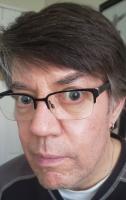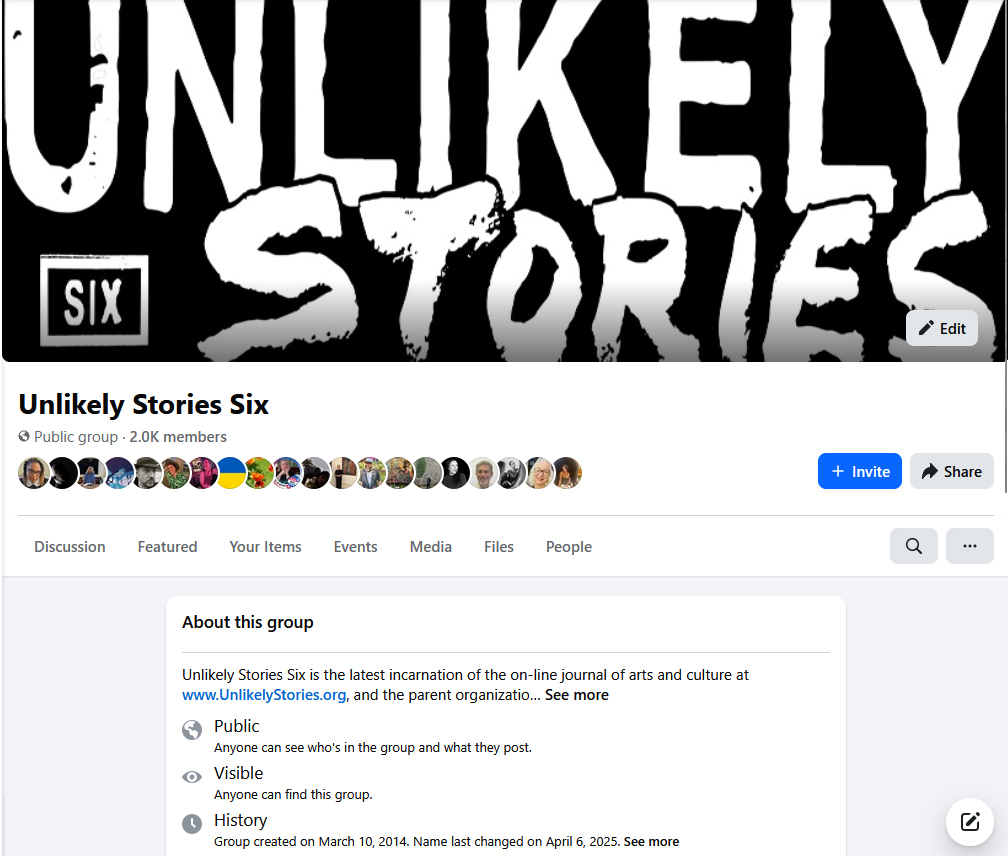Back in the former times I had a voice and a guitar and I used to play them occasionally in a small basement pub not far from my house. It was always smoky and dim and the thick air smelled of nicotine and hash cigarettes and there was a constant mustiness and it all blended together with the patrons' low-volume sound. My guitar was scratched and my voice was scratchy and they matched the wornness of the pub's wooden floor and wooden bar and wooden stools and tables.
I don't remember precisely how the owner of the pub, a burly bald man named Jones, first learned that I could play music. He was an intriguing individual, huge and tattoo-covered from his arms up to his neck. All the images, snakes and skulls and weapons, were dark-coloured except for a single yellow flower under his right ear that amused me because it hinted meekly at life. I saw Jones sneeze once. He was so big and he had such a deep voice so I assumed that his sneeze would be noisy and powerful, but it was silent. His whole body shook like an eruption but there was no sound.
We must have had a conversation while I was sitting at the bar and he was serving me drinks and someone else was on the tiny stage performing and I must have mentioned flippantly that I could sing and play too.
"Can you play tomorrow night?" Jones asked me. He never wondered if I had ever played anywhere before or what kind of music I liked or even if I was any good.
I told him that, yes, I could come back tomorrow.
"I can't pay you with money," he said, "only with drinks and hash and cigarettes and maybe a bit of cocaine now and then."
I said that was fine, I didn't really have much to spend money on anyway.
Jones didn't say anything else. He walked away and disappeared around a corner and then came back with a small mirror and it had a thin line of cocaine on it and he placed it down on the bar in front of me and he smiled and nodded. I snorted it quickly and continued to feel fine, then I finished my drink and went home.
The next night, I had to walk in the rain to get to the pub and I was wet and uncomfortable when I arrived but it didn't bother me. I entered and Jones saw me and he pointed at the tiny stage and its single wooden stool and silver microphone and I maneuvered up to it through the few people and I opened my case and took out my guitar and sat down without saying a word. I looked at Jones who was behind the bar and he nodded so I began strumming and then singing in my raspy semi-melodic way.
My first song, if I remember correctly, was about families who were travelling poorly across the country with their few possessions, looking for work and for places to live that were less dusty. Then I sang about a young couple in love and then I sang an old blues song about drinking and dancing. At the end of each, there was a smattering of applause from the people who weren't ignoring me.
Then I played one more song, an original one that I had written when I was young. It was about Moses in his basket and, using my own words, I contemplated how life could have been different if he hadn't floated well on the river and if he had, instead, drowned. When I finished, I stood up and placed my guitar in its case and leaned it against the wall and then I walked to the bar and sat down. Jones approached me with a drink and I consumed half of it quickly.
"Why don't you talk between songs?" he asked. "You didn't even introduce yourself."
I shrugged and told him I really didn't have anything to say.
"Were you nervous? Is that why you didn't talk?" he pressed.
I don't get nervous, I told him, I don't think anything I say or do matters much, and if nothing I do matters much, there's no reason to be nervous about anything.
"Can you come back next week and play again?"
I said sure, I can do that.
Each time I came back, the first few times anyway, I played the same songs but, on occasion, as time passed, I played a different one and then I started trying to be a bit more varied. The last song though, it was always the one about Moses. Rarely did anyone say anything to me after, but I wasn't doing it for them. I wasn't really doing it for me either, to be honest, I was just doing it. Once, when I had finished playing, a straw-haired middle-aged drunken woman approached me. I was still on the stage. Her shirt was unbuttoned inappropriately and her skin looked wrinkled and dry.
"Did you write that Moses song?" she slurred. She held a high-ball glass in her hand and it was half-full with a classically clear liquid and some ice.
I wrote it, I said.
"Do you really think life would be different if he had drowned?" She choked a bit when she asked, then sipped her drink aggressively.
I don't know, I said, it's just a song.
"Did you write it?" She had already forgotten.
Yes, I said, I wrote it.
"But you have no ideas if life would be different if he had drowned?" Her face twisted and she swallowed brusquely and I thought maybe she was going to be sick.
No, I said, I have no ideas.
At the bar, after this conversation, Jones brought me a drink and a cigarette and the mirror with its short thin white line and I snorted it quickly and then consumed my drink leisurely.
"That woman never talks to anyone," he said. "She must like you or something." He grinned and punched my shoulder.
I don't know, I said, it doesn't matter.
"Are you going to ask her to go home with you?"
No, I answered.
"Why not?"
I'm not interested, I said. Jones walked away to the other end of the bar after that. He had another customer to serve. I finished my drink and, when I caught his attention a few minutes later, I motioned for another one and he brought it to me silently.
This was during the former times, when it was easier. It wasn't easy, I'm not making that claim, it was just easier, just different. There was still violence and murder and random cruelty like people do. But it was a bit more free and it was permissible to gather and drink in pubs and talk somewhat openly and people could go where they wanted to go and occasionally snort a line or two of cocaine and smoke some hash without too much fear. Changes were starting to simmer in the background but I guess no one knew yet. I didn't know.
One thing I do know, I observed it, is that, when life is simple and repetitive, it's easy to spot an anomaly. They're obvious because they don't fit the pattern, like a clash.
At the pub, on a hot summer night, when I had almost finished playing the song before Moses, and the few people in front of me straggled about or sat alone motionlessly and the straw-haired woman swayed drunkenly back and forth in a corner, the front door opened and a man in a dark suit entered and he was an anomaly. I was sweating and the patrons and even Jones were sweating and we were all in short-sleeves, but the man wore a suit. When the door closed behind him, he didn't sit down and he didn't go up to the bar, not initially. He just leaned against the wall and looked around and then he took a notepad and a pen out of his jacket pocket and wrote something down and then he looked in a different direction and wrote again. I observed this as I played. It didn't interrupt me but it was an anomaly. When I started singing Moses, the man walked to the bar and Jones approached him and they talked briefly and then he wrote something else and then he left without even ordering a drink. I finished my song and put my guitar in my case and stepped away from the stage and went to the bar. Jones brought me a beer.
"I can't give you any cocaine or hash today," he said. His bald head was glistening with sweat and he seemed edgy.
I don't mind, I said, I don't need it.
Then Jones said, "Did you see that man?"
Yes, I answered, I saw.
"He never told me who he was." Jones was uneasy, nervous-like. Even the yellow flower tattoo under his ear seemed faded and bleak. He continued after a pause. "He asked me questions, like he was an official or something." He stopped to take a deeper breath. "He asked me about who comes in here and what they drink and he asked if I hear what people talk about and then he asked if I always allow religious songs. He asked that when you were playing Moses."
I saw, I said.
"I told him it wasn't really a religious song, it was just about Moses, that's all. I don't think he cared much though."
Most people don't care, I said.
"Do you care?" Jones asked me.
No, not really, I answered, I don't think it matters.
A customer, a couple actually, they were regulars, motioned to Jones from the other end of the bar. I finished my drink and got up and returned to the stage to get my guitar and then I went home.
Those were the former times. I don't know what happened to Jones because his pub was closed down and I never saw him again. All pubs were closed down. When the New Authority assumed power, they shut all the places where people could go and congregate spontaneously. They said places like that were dangerous and allowed the spread of dangerous ideas. They stopped songs too, for the same reason. We can't even sing at home. They'll know. The only song we hear now is the anthem that is played every morning through the speakers on the streets. It's like a song of praise for the new order.
We can walk outside as long as we're careful with what we say and where we go. We have to be careful. The officials are everywhere, at least that's what we've been told. Some are obvious, always in dark suits, but many are supposedly incognito. Anyone could be an official. That's what we've been told.
I saw the straw-haired lady once in a park. She was sitting on a blanket next to a tree and I know she glanced in my direction. She didn't acknowledge me though, even when I walked towards her. Her eyes were open but glassy and she had a line of saliva dripping off her bottom lip. I guess she might have been drunk. I don't know where she would have found the alcohol. Alcohol is illegal now. If she is still drinking, they'll track her down quickly. Cocaine and hash were banished too. Food isn't a problem though, in my opinion. We eat regularly, repetitively, accepting what is provided. I do, anyway. I'm not certain but I think most people are still working in some way. Societal structure is so different, it's hard to know for sure.
None of this really matters to me. I'm not bothered. I'm fine.





Comments
MichMMi8cichaeM... (not verified)
Michael Tyler (not verified)
Add comment